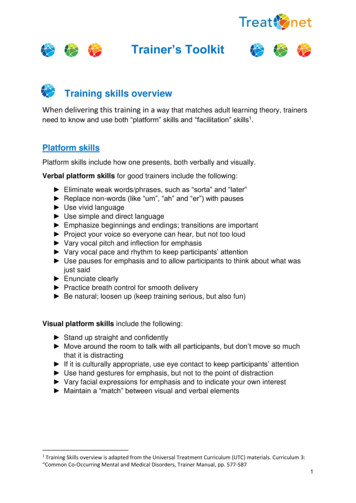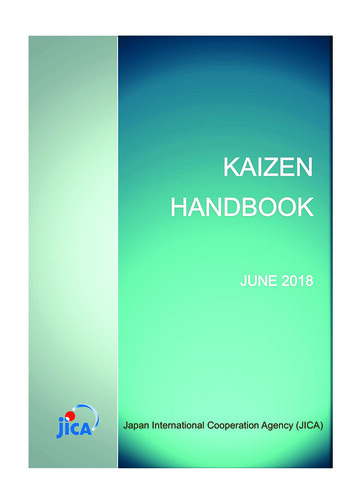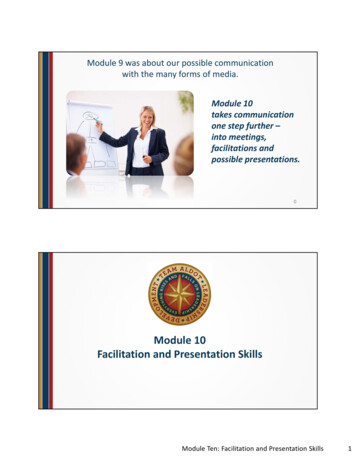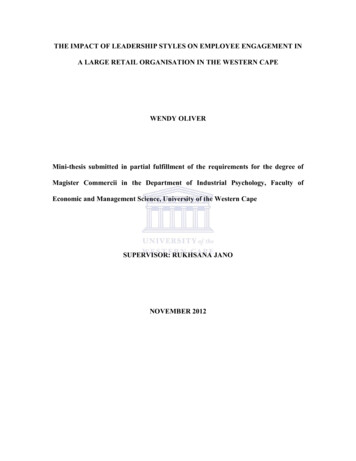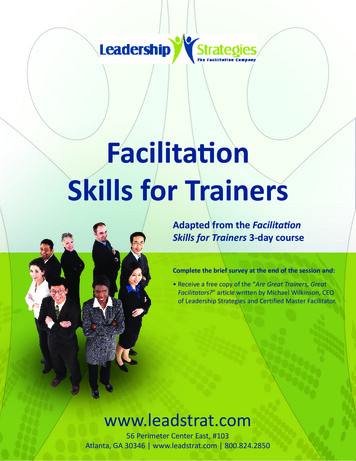
Transcription
FacilitationSkills for TrainersAdapted from the FacilitationSkills for Trainers 3-day courseComplete the brief survey at the end of the session and: Receive a free copy of the “Are Great Trainers, GreatFacilitators?” article written by Michael Wilkinson, CEOof Leadership Strategies and Certified Master Facilitator.www.leadstrat.com56 Perimeter Center East, #103Atlanta, GA 30346 www.leadstrat.com 800.824.2850
2All rights reserved. This document is adapted from the Facilitation Skills for Trainers coursemanual and other proprietary materials of Leadership Strategies, Inc. – a Georgia Corporation.Leadership Strategies grants recipient right to copy materials for personal use and enjoyment.Copies of The Effective Facilitator manual and other products may be purchased directly fromLeadership Strategies, Inc. or from our website, www.leadstrat.com.56 Perimeter Center East, #103Atlanta, Georgia omDuplication prohibited without prior written consent of Leadership Strategies, Inc.COPYRIGHT 2013 LEADERSHIP STRATEGIES, INC. WWW.LEADTRAT.COM 800.824.2850FACILITATION SKILLS FOR TRAINERSCopyright Leadership Strategies, Inc. 2013
3A1. Who is Leadership Strategies?A2. Session ObjectivesA3. SurveyA4. Session AgendaA5. Handling QuestionsA6. Our Session FacilitatorA7. Course OverviewDuplication prohibited without prior written consent of Leadership Strategies, Inc.COPYRIGHT 2013 LEADERSHIP STRATEGIES, INC. WWW.LEADTRAT.COM 800.824.2850FACILITATION SKILLS FOR TRAINERSA. Getting Started
4 The Facilitation Company - expert meeting facilitators andfacilitation training in the U.S. Over 500 facilitators under contract through The FacilitatorDatabase Over 17,000 trained in facilitation skills through The EffectiveFacilitator and other courses Provides public classes in Atlanta, Boston, Chicago, Dallas,DC, Denver, Houston, LA, New York, San Francisco, Seattle,Sydney, Toronto and private, onsite classes globally.A2. Session Objectives Outline best practices from the Facilitation Skills for Trainerscourse related to developing training that appeals to alllearning styles. Provide over a dozen techniques you can begin using immediately Provide next steps for those who would like to learn moreDuplication prohibited without prior written consent of Leadership Strategies, Inc.COPYRIGHT 2013 LEADERSHIP STRATEGIES, INC. WWW.LEADTRAT.COM 800.824.2850FACILITATION SKILLS FOR TRAINERSA1. Who is Leadership Strategies?
5For all of those who complete the short survey at the end of thesession, we will: Send you a free article, “Are Great Trainers, GreatFacilitators?”, written by Michael Wilkinson, Certified MasterFacilitator and CEO of Leadership Strategies, Inc.A4. Session Agenda Getting Started Overview of the Principles of Facilitation/Training Facilitation Tools and Techniques Next Steps Questions & AnswersDuplication prohibited without prior written consent of Leadership Strategies, Inc.COPYRIGHT 2013 LEADERSHIP STRATEGIES, INC. WWW.LEADTRAT.COM 800.824.2850FACILITATION SKILLS FOR TRAINERSA3. Survey
6If you have questions: Type them into the question panel Call 800.824.2850 Contact us online www.leadstrat.com Email etraining@leadstrat.com Connect on LinkedIn, Facebook, and TwitterA6. Our Session FacilitatorWayne PendleLEADERSHIP STRATEGIESDuplication prohibited without prior written consent of Leadership Strategies, Inc.COPYRIGHT 2013 LEADERSHIP STRATEGIES, INC. WWW.LEADTRAT.COM 800.824.2850FACILITATION SKILLS FOR TRAINERSA5. Handling Questions
7Duplication prohibited without prior written consent of Leadership Strategies, Inc.COPYRIGHT 2013 LEADERSHIP STRATEGIES, INC. WWW.LEADTRAT.COM 800.824.2850FACILITATION SKILLS FOR TRAINERSA7. Course Overview
8B1.B2.B3.B4.B5.B6.B7.B8.B9.B10.B11.Defining ResultsThe 4 Levels of Training EvaluationDeveloping Learning ObjectivesThe 3 Learning StylesThe Principles of EngagementInstructional Methods and EngagementStrategiesCreating from ScratchDesigning for ResultsDeveloping for ResultsHandling LogisticsTraining Impact***Only the topics in bold are covered in this webinar. All topicsare covered in our full, 3-day public or private “FacilitationSkills for Trainers” course.Duplication prohibited without prior written consent of Leadership Strategies, Inc.COPYRIGHT 2013 LEADERSHIP STRATEGIES, INC. WWW.LEADTRAT.COM 800.824.2850FACILITATION SKILLS FOR TRAINERSB. PLANNING FOR RESULTS
B2. The 4 Levels of Training Evaluation Level 1 measures the trainees’and acceptance of the material Level 2 Measures the trainees’of knowledge and skills Level 3 Measures changes inand on-the-job improvement Level 4 Measures organizational &improved operational performanceDuplication prohibited without prior written consent of Leadership Strategies, Inc.COPYRIGHT 2013 LEADERSHIP STRATEGIES, INC. WWW.LEADTRAT.COM 800.824.2850FACILITATION SKILLS FOR TRAINERSWhile training evaluation is beyond the scope of this course,below is a review of Donald Kirkpatrick’s Four-Phase EvaluationModel.9
B5. Five Principles of Engagementworld and workplace.2. Assure a high degree of learner ,which will in turn assure high levels of participation.3. Plan a of difference learningexperiences.4. Maintain interest by selecting the appropriate learning.5. Allow learners to share their in theclassroom setting.Duplication prohibited without prior written consent of Leadership Strategies, Inc.COPYRIGHT 2013 LEADERSHIP STRATEGIES, INC. WWW.LEADTRAT.COM 800.824.2850FACILITATION SKILLS FOR TRAINERS1. Assure the of content to the real10
B6. Instructional Methods2. Demonstration3. Discussion4. Exercises5. Feedback Activities6. Games7. Icebreakers8. Lecture9. Participant Practice10. Role Plays11. Simulations12. Sub-GroupsDuplication prohibited without prior written consent of Leadership Strategies, Inc.COPYRIGHT 2013 LEADERSHIP STRATEGIES, INC. WWW.LEADTRAT.COM 800.824.2850FACILITATION SKILLS FOR TRAINERS1. Case Studies11
B6. Instructional Methods To introduce new key learning pointsWhen? To reinforce ideas and concepts alreadypresentedDuplication prohibited without prior written consent of Leadership Strategies, Inc.COPYRIGHT 2013 LEADERSHIP STRATEGIES, INC. WWW.LEADTRAT.COM 800.824.2850FACILITATION SKILLS FOR TRAINERSWhat?Case Studies are written or video scenarios thatcontain learning points specifically tied to thesubject matter being taught. They usually presenta problem or situation that needs resolution --sometimes very sophisticated and sometimes verysimple.Harvard Case Studies, used for executive development, might be fifty pages long and contain multiple situations that complicate the sub-group’s ability to reach consensus. In comparison, a mini-casestudy used in supervisory development might bewritten on a half page, which ends with the question, “What action should the supervisor take?”In either case, the situation must be detailed outenough for the sub-group working on the case toanalyze the current situation and project a logicalsolution.12
13Duplication prohibited without prior written consent of Leadership Strategies, Inc.COPYRIGHT 2013 LEADERSHIP STRATEGIES, INC. WWW.LEADTRAT.COM 800.824.2850FACILITATION SKILLS FOR TRAINERSHow?Introduce the case study: Present the case study in detail. Give participants ample time to read and studythe case before discussion begins. Provide the case study questions in advance inwritten form. Provide specific time frames for reading thecase, discussing the case, and resolving thecase. Provide flipchart paper, pens and othernecessary supplies.Facilitate the case study: Circulate from group to group, checking on thegroup’s progress. Make yourself available toassist and support the groups, but stay neutral.Assist but don’t participate. Observe both task and process, so you canprovide specific feedback during the processingstage. Keep participants informed of the timerequirements, and end the case studyappropriately project a logical solution.
14Duplication prohibited without prior written consent of Leadership Strategies, Inc.COPYRIGHT 2013 LEADERSHIP STRATEGIES, INC. WWW.LEADTRAT.COM 800.824.2850FACILITATION SKILLS FOR TRAINERSWrap?Process the case study: Set aside an appropriate amount of time forprocessing. Review the case study questions one at atime. Rotate from group to group asking the“spokesperson,” from each group to report.Don’t let the first group that reports give allthe information. You might have groups answerdifferent questions rather than respond toevery one. Record and point out the differences in eachgroup: What information they paid attention to How they went about arriving at conclusions The different conclusions they drew from thesame information that was presented How the conclusions they drew relate tothe problem-solving process, etc. they werebeing taught
B6. Engagement Strategies13. Forced Analogies*2. BINGO Icebreaker14. Future Letter3. Brainstorming(Basic)15. Group Questioning*16. Introductions4. Brainstorming withPost-Its5. Brief Encounters*6. Crossword Puzzle,Find-a-Word, &Cryptogram7. Dot Voting*17. IntroductionsUsing Drawing18. Jeopardy19. Journaling20. Last PersonStanding*21. Metaphors andAnalogies8. Drawing9. Dump and Clump*10. Dyads / Triads25. Selecting TeamLeaders26. Start / Stop /Continue*27. Stories28. StructuredDiscussion29. Talking Stick*30. Think-Pair-Share31. Wheel-of-Fortune32. Whip*22. More Of / Less Of*11. Elevator Speech*23. Rotating FlipCharts*12. Examples24. Round RobinDuplication prohibited without prior written consent of Leadership Strategies, Inc.COPYRIGHT 2013 LEADERSHIP STRATEGIES, INC. WWW.LEADTRAT.COM 800.824.2850FACILITATION SKILLS FOR TRAINERS1. Bingo15
NameLAST PERSON STANDING16TypeGather information; generating unique items for alist or ideas.FACILITATION SKILLS FOR TRAINERSTo identify the informationfrom a large set of team ideas in a short andenergy-filled period of time.PurposeGeneralDescriptionTeams (or individuals) are asked to gather as muchinput as they can. Then the Team Leader has acompetition with other Team Leaders to determine which team has the most number of uniqueideas. (All other participants act as the judges tohelp identify the duplicates.)BenefitCompetitive and energetic approach to infuse energy into the session. Especially good during thoselull times of the day. The purpose of this exercise is for us toidentify as many different characteristics of (anenergetic speaker) as we can.Sample Words For example, if we were looking for a list ofall of the automobile models that we couldthink of, we would be looking for a list thatwould include items like Taurus, Impala, Escort,Escalade, Jetta, 626, etc. But we are not Duplication prohibited without prior written consent of Leadership Strategies, Inc.COPYRIGHT 2013 LEADERSHIP STRATEGIES, INC. WWW.LEADTRAT.COM 800.824.2850
Let’s write each of those characteristics, oneper post-it note, that caused you to listen towhat he/she was saying Other TipsEach team leader is asked to come to the frontof the room and one-by-one, team-by-team theypost their answers to a flip chart. For example,Team Leader #1 posts one answer and moves tothe back of the line, then Team Leader #2 postsone answer and moves to the back of the line, etc.While the Team Leaders are posting their answers,ask the audience to identify duplicates by raising crossed arms and saying “oonk.” This helps tokeep the entire group engaged.When a duplicate is identified, the facilitator collects that post-it and the Team Leader goes to theback of the line. The second duplicate eliminatesthat team. By using color post-its by team, it isclear when the 2nd duplicate is identified.Duplication prohibited without prior written consent of Leadership Strategies, Inc.COPYRIGHT 2013 LEADERSHIP STRATEGIES, INC. WWW.LEADTRAT.COM 800.824.285017FACILITATION SKILLS FOR TRAINERSSample Words(cont.) What we are doing is identifying thecharacteristics of an energetic speaker. So, thinkabout the last time you were at a meeting orpresentation and a speaker began his or herpresentation. Right away the speaker simplycaptured your attention; you were almost onthe edge of your chair because of the speaker’sapproach.
JEOPARDYTypeGamesTo review information that has been.PurposeParticipants play Jeopardy to review course content or to establish how much they already knowabout the course content.GeneralDescription Group competition motivates participantsBenefit Energizes the class Fun and enjoyableInstructions:Sample Words On a flipchart slide create the frame for thegame with 5 categories and points from 100 to500 in increments of 100. Label the 5 categories across the top. Create 5 answers for each category and recordon cards. The 100 point answers must be moredifficult than the 500 point answers.Duplication prohibited without prior written consent of Leadership Strategies, Inc.COPYRIGHT 2013 LEADERSHIP STRATEGIES, INC. WWW.LEADTRAT.COM 800.824.285018FACILITATION SKILLS FOR TRAINERSName
Divide the class into teams. Have one personstand from each team to be the team leader.(You can have the leader rotate after three orfour questions).Sample Words(cont.) You can use a buzzer or bell or have peopleraise their hand to indicate they know theanswer. Or you can just rotate the questionfrom team to team. The game starts by having a person selecta category and an amount. (Cross out thecategory and amount on the flip chart when itis requested.) Read the answer card. The team that buzzesfirst has 15 second to give a response. If theteam gets it correct, the team is awarded thatnumber of points. If the team gets it wrong orruns out of time, the team loses that numberof points and another team gets to attempt toanswer. The team that last gave a correct response thenchooses a category and amount.Duplication prohibited without prior written consent of Leadership Strategies, Inc.COPYRIGHT 2013 LEADERSHIP STRATEGIES, INC. WWW.LEADTRAT.COM 800.824.285019FACILITATION SKILLS FOR TRAINERS You can decide if the answer they give must bephrased as a question. You should also decideif teams can use books and notes to help findanswers. You can also choose to start eachteam out with 0, 500 points, or something inbetween to allow for mistakes.
Each team’s final answer is revealed and thentheir wager to determine the highest scoringteam.Other TipsIf participants are familiar with other ways to playthe game, explain that you have changed or modified the rules to suit course purposes.Duplication prohibited without prior written consent of Leadership Strategies, Inc.COPYRIGHT 2013 LEADERSHIP STRATEGIES, INC. WWW.LEADTRAT.COM 800.824.285020FACILITATION SKILLS FOR TRAINERSSample Words(cont.) You can choose to have a “Final Jeopardy”question in which all teams have anopportunity to answer the last question. In thiscase the teams all privately set the amountthey want to wager after learning the categoryof the final response. All teams are given thefinal answer, and teams record their responses.
21C1.C2.C3.C4.C5.C6.C7.When You Arrive Your Opening Words: I.E.E.I.Request Participant Objectives (Involve)Review the AgendaEstablish Ground RulesDefine the Parking Boards (ICA)Review Housekeeping ItemsDuplication prohibited without prior written consent of Leadership Strategies, Inc.COPYRIGHT 2013 LEADERSHIP STRATEGIES, INC. WWW.LEADTRAT.COM 800.824.2850FACILITATION SKILLS FOR TRAINERSC. Starting with Impact
C3. Request Participant Objectives1.them immediately.2.Lets them know their andare being considered3.Provides opportunity tointo the training.Set the Stage with Your Opening: I-E-E-I about the purpose and product about the benefits to them by discussing the important role they playin the process through personal objectives andparticipationDuplication prohibited without prior written consent of Leadership Strategies, Inc.COPYRIGHT 2013 LEADERSHIP STRATEGIES, INC. WWW.LEADTRAT.COM 800.824.2850FACILITATION SKILLS FOR TRAINERSWhy?22
23D1. Training vs. FacilitationD2. Ask Starting Questions that IgniteDiscussionD3. Ask Reacting Questions to Probe andClarifyD4. Use Checkpoints for TransitionsD5. Warm up the GroupD6. Use PeDeQs to Give DirectionsD7. Redirect Side IssuesD8. Order Speakers to Maintain ControlD9. Summarize ResultsD10. Be Conscious of TimeD11. Keep the Energy HighDuplication prohibited without prior written consent of Leadership Strategies, Inc.COPYRIGHT 2013 LEADERSHIP STRATEGIES, INC. WWW.LEADTRAT.COM 800.824.2850FACILITATION SKILLS FOR TRAINERSD. Delivering for Results
D1. Training vs. FacilitationTRAININGFACILITATIONFocus on ContentFocus on bothContent &ProcessFocus on lopmentGroup olvesAsks/GuidesTelling gListeningFocusCornerstones of a Good InstructorDuplication prohibited without prior written consent of Leadership Strategies, Inc.COPYRIGHT 2013 LEADERSHIP STRATEGIES, INC. WWW.LEADTRAT.COM 800.824.2850FACILITATION SKILLS FOR TRAINERSPRESENTATION24
25E1. Using Visual Aids in TrainingE2. Recording InformationE3. Recording TechniquesE4. Maintaining Interest and OrderE1. Using Visual Aids in Training Are the visual tools we use today the most effective?-What are the tools that we use to present information? Which are most beneficial and successful? Which are least? What can we do to improve this in the our setting?Duplication prohibited without prior written consent of Leadership Strategies, Inc.COPYRIGHT 2013 LEADERSHIP STRATEGIES, INC. WWW.LEADTRAT.COM 800.824.2850FACILITATION SKILLS FOR TRAINERSE. Managing Visual Information
26F1.F2.F3.F4.F5.Confirming Knowledge TransferReviewing to CloseEvaluatingWrapping UpConducting the DebriefF1. Confirming Knowledge TransferReviewing material is absolutely critical. It reinforces thelearning, and it should be done as often as possible --especially around critical learning points. But, repetition mustbe varied.Examples: Reviewing for KnowledgeTransfer Backward Build-up Testing and Quizzing Climate Checks Dots Jewels Course Action Planning Support GroupsDuplication prohibited without prior written consent of Leadership Strategies, Inc.COPYRIGHT 2013 LEADERSHIP STRATEGIES, INC. WWW.LEADTRAT.COM 800.824.2850FACILITATION SKILLS FOR TRAINERSF. Confirming Results & Closing
F3. Evaluatingimprovement cycle.2. Encourage specific .3. Do a group if possible.Duplication prohibited without prior written consent of Leadership Strategies, Inc.COPYRIGHT 2013 LEADERSHIP STRATEGIES, INC. WWW.LEADTRAT.COM 800.824.2850FACILITATION SKILLS FOR TRAINERS1. is a critical part of the continuous27
28G1.G2.G3.G4.G5.G6.G7.G8.Understanding Dysfunctional BehaviorSeparate Symptom from Root CauseFocus on PreventionDetect Non-Verbal CuesAddress Dysfunction EffectivelyInform the Group When AppropriateReward Functional BehaviorRespond Appropriately When ChallengedG3. Focus on PreventionDevelop and execute strategies for preventing problems. Assigning AddingDuplication prohibited without prior written consent of Leadership Strategies, Inc.COPYRIGHT 2013 LEADERSHIP STRATEGIES, INC. WWW.LEADTRAT.COM 800.824.2850FACILITATION SKILLS FOR TRAINERSG. Managing Dysfunction
Making sure you with particular peope Holding during breaksDuplication prohibited without prior written consent of Leadership Strategies, Inc.COPYRIGHT 2013 LEADERSHIP STRATEGIES, INC. WWW.LEADTRAT.COM 800.824.2850FACILITATION SKILLS FOR TRAINERS Paying close attention to particular29
30If you would like to learn more: Public Class: Facilitation Skills for TrainersAtlanta: April 22-24, November 4-6Private Class: At Your CompanyMost cost-effective for 8 or more Purchase a ProductThe Secrets of Facilitation, 2nd EditionFacilitator GuidesQuestions? Call: 1-800.824.2850 Email: info@leadstrat.comDuplication prohibited without prior written consent of Leadership Strategies, Inc.COPYRIGHT 2013 LEADERSHIP STRATEGIES, INC. WWW.LEADTRAT.COM 800.824.2850FACILITATION SKILLS FOR TRAINERSNEXT STEPS
Page9Fill-in-the-blank InformationReactions, Learning, Behavior, Results10Relevance, Involvement, Variety, Methods,Experience Sharing22Involves, Needs and Desires, Integrate their interests22Inform, Excite, Empower, Involve2480%/20%, 50%/50%, 20%/80%27Feedback, Comments, Review28 - 29Seats, Groud Rules, Interact, Reactions, Informal MeetingsDuplication prohibited without prior written consent of Leadership Strategies, Inc.COPYRIGHT 2013 LEADERSHIP STRATEGIES, INC. WWW.LEADTRAT.COM 800.824.285031FACILITATION SKILLS FOR TRAINERSAnswers tothe Fill-in-the-Blank
32Professional FacilitationLeadership TrainingMeeting FacilitationStrategic PlanningIssue ResolutionFacilitation SeriesSystems AnalysisTeam BuildingConference FacilitationProcess ImprovementManagement SeriesManagement to LeadershipThe Effective FacilitatorThe Facilitative ConsultantFacilitating IT SessionsThe Effective CommunicatorFacilitating Virtual Meetings:Effective Presentation SkillsComprehensiveFacilitating Virtual Meetings: EssentialsMaking Technical Meetings Work!Facilitation Skills for TrainersPlanning SeriesIT SeriesStrategic PlanningProject PlanningProject LeadershipManaging User RelationshipsAlong with being expert facilitators, we also train people in facilitation skills, leadership, teambuilding, presentations and consulting skills. We offer public classes in Atlanta, Chicago, Dallas,Denver, Houston, Los Angeles, Seattle and Washington, DC, and on-site private classes globally.56 Perimeter Center East, #103Atlanta, Georgia 30346800.824.2850www.leadstrat.comDuplication prohibited without prior written consent of Leadership Strategies, Inc.COPYRIGHT 2013 LEADERSHIP STRATEGIES, INC. WWW.LEADTRAT.COM 800.824.2850FACILITATION SKILLS FOR TRAINERSLeadership Strategies - The Facilitation Company is the US leader in meeting facilitation services andtraining. We provide companies with expert facilitators who facilitate executive teams and task forcesin topics such as strategic planning, issue resolution, requirements analysis, process improvementand conference forums.
Skills for Trainers Adapted from the Facilitation Skills for Trainers 3-day course Complete the brief survey at the end of the session and: Receive a free copy of the "Are Great Trainers, Great Facilitators?" article written by Michael Wilkinson, CEO of Leadership Strategies and Certified Master Facilitator. www.leadstrat.com

